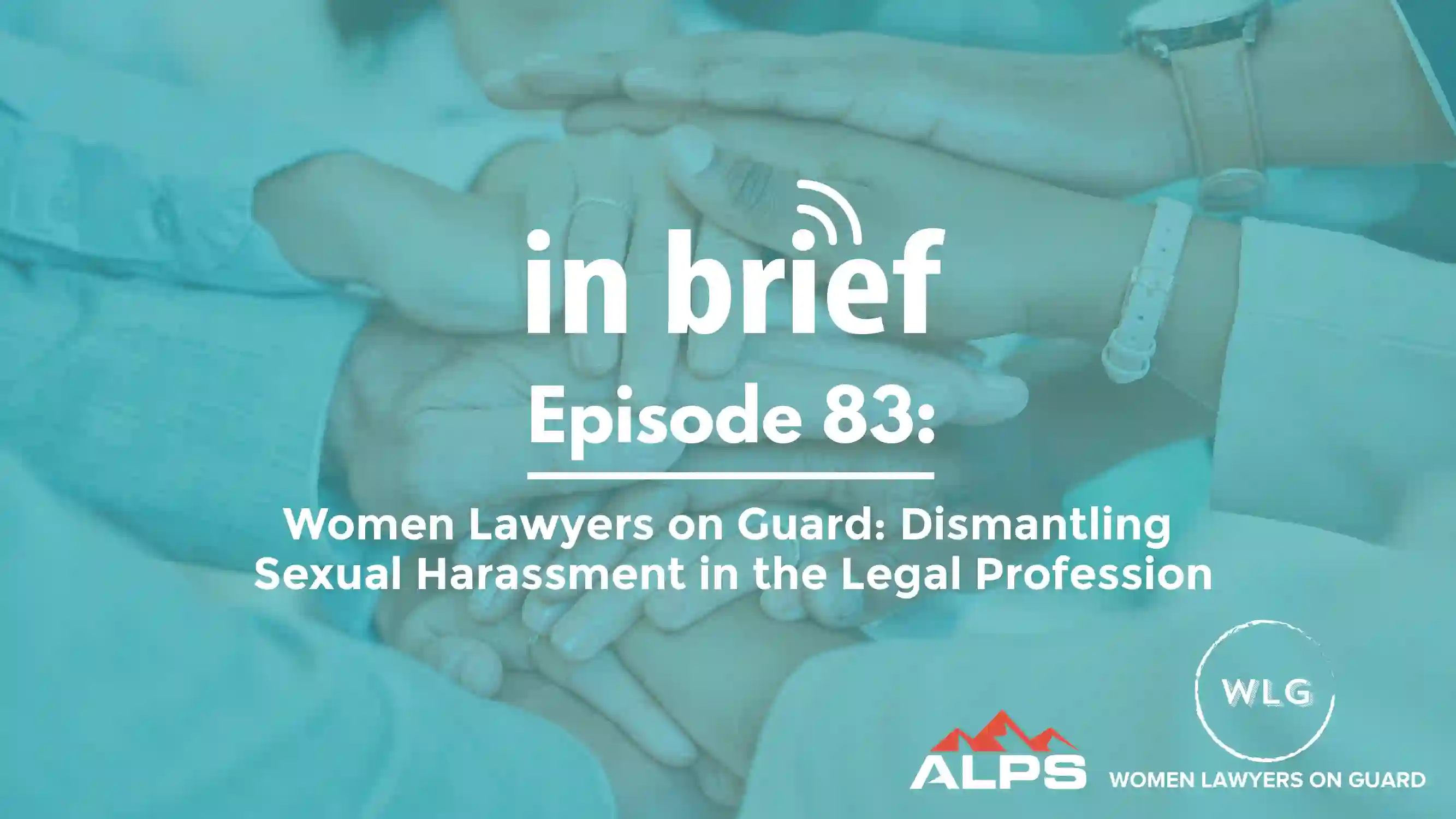Gender and Other Biases in the Legal Profession
4 min read
 Janel Chin
:
Updated on November 1, 2022 | Posted on December 13, 2018
Janel Chin
:
Updated on November 1, 2022 | Posted on December 13, 2018

The following is a guest post by Missoula, MT attorney Janel F. Chin.
As an attorney in my late thirties, I can assuredly say that I have personally experienced all of the four main patterns in gender bias identified in the ABA Commission on Women in the Profession’s report: Bias Interrupters Project – You Can’t Change What You Can’t See: Interrupting Racial and Gender Bias in the Legal Profession. It is my hope that sharing my personal responses to a few of the findings here will continue to encourage corrections to these biases where they exist. Many times bias is exerted without realization that it is being done. It is my intention to encourage conversations and I am happy to engage with any interested parties moving forward on these issues.
- The first pattern identified is termed Prove-It-Again. This was described as a woman or racial minority being expected to work significantly harder than others in their workplace just to be on the same playing field, albeit not a level one. In a profession where hard work is good work, this pattern leads me to wonder if the Prove-It-Again bias is underreported by others like me who have been raised to believe that going the extra mile will always result in personal benefits. An increased focus on earning and getting the most from investing may help alleviate some of the financial pressures women have historically faced and is something being promoted more and more through companies such as Ellevest, an investment platform created for women.
- The second pattern identified is termed Tight Rope. It is described as a narrower range of behavior expected and deemed appropriate for a woman and the increased likelihood to be treated with disrespect in the workplace. While reading about this pattern of gender bias I definitely could relate. I have experienced this pattern many times throughout my life. It can be a difficult one to try and address on an individual level.
I suspect that my experiences dealing with these biases inadvertently guided me toward the types of contract and self-employment work where I have spent my legal career to this point. While there can be drawbacks to self-employment or contract work (mainly lack of workplace benefits), in these settings the work (and getting paid for that work) is laid out and clearly delineated from the outset, leaving less space for biases like these to operate. One big downside of spending my career thus far doing contract work is that I was never afforded maternity leave. I was fortunate in that my partner’s salary and benefits allowed me to lower my work load without imposing any undue financial hardships on our family. Many contract attorneys do not have that same luxury, which leads to concerns about parenting related bias next identified by the report:
- Maternal Wall cites how women are dramatically less likely to be hired (79% according to this report) after having children. White women reported having their commitment or competence questioned after having kids at levels 36% higher than white men. Reading this part of the report brought back memories not only of conversations had at my workplaces during both of my pregnancies and post-partum periods but also of internship and job interviews as a married but childless law student. I remember feeling confused when interviewers would note my wedding band or last name that did not match their pre-conception of my ethnicity. I remember being asked prying questions about my personal life, about my marriage, that made it apparent that they felt that whether I had children, and when, was quite relevant to my appeal as a candidate for a position with their organization.
- The final pattern identified in the ABA’s report is termed Tug of War and describes the conflicts that occur between disadvantaged groups of people. I personally thought of many of the strange interactions I had with folks in various settings after changing my last name from “Falk” to “Chin” after marriage. It used to be that although I was a woman, there were no misunderstandings when I applied for opportunities perhaps because application materials indicated that I was female via my gendered name: “Janel.” However, after my name changed from “Janel Lynn Falk” to “Janel Falk Chin,” I would often encounter confusion when I arrived for interviews and events as people expected an Asian woman. My whiteness was often met with disappointment making me realize how much racial bias exists.
According to the ABA’s report, 42% of white men, 47% of men of color, 50% of women of color, and 57% of white women all agreed that taking family leave would negatively impact their career. This statistic is one that did not surprise me as I have heard it over and over again from fellow parents in my communities. To make legal workplaces more welcoming to women, people of color, and parents, we can all start by not assuming someone’s position in the workplace based on their appearance: white, female attorneys reported being mistaken for administration staff, court personnel, or janitorial staff at a rate 44% higher than white men. Secondly, we can all make an effort in our workplaces and in our personal lives to support one another when a family’s needs at home are not being met and time off is needed. We all benefit at work when our children’s and other dependents’ needs are met. In conclusion, if you care about fairness and equity in your community and workplace, it is important to:
(1) Connect with those of a different gender and race from your own
(2) Ask what you might to do assist them in tackling biases like those detailed above
(3) Listen and respond to ideas that vary from those you have heard before.
Janel F. Chin has been practicing law in Montana since 2012. Committed to helping her clients navigate the peaks and valleys of their lives by offering reasonably priced legal services, Janel’s practice focuses on estate planning, probate and family law in the Missoula area she calls home. Janel is an active volunteer with several local nonprofits and enjoys spending time with her husband and young daughters. First licensed to practice law in Colorado after her 2007 graduation from the University of Colorado School of Law, Janel brings past experiences with alternative dispute resolution, the Indian Child Welfare Act, the American Indian Probate Act and to her work. Originally from north-central Idaho, Janel received a Bachelor of Science degree in Environmental Science from the University of Idaho in 2003. During both law school and her undergraduate education, Janel worked as a Research Associate focusing on Federal Indian law and natural resource management disputes. Janel specializes in meeting the unique needs of her clients and has experience preparing estate plans for clients of the Bahá’í Faith in accordance with the law of Huququ’llah.
Janel is passionate about helping clients navigate the emotional, organizational and legal challenges they face in the course of their lives and can be reached via phone at 406.207.6462 or email at peaksandvalleyslegalservices@gmail.com.
Categories
Authored by: Janel Chin
Janel F. Chin has been practicing law in Montana since 2012. Committed to helping her clients navigate the peaks and valleys of their lives by offering reasonably priced legal services, Janel’s practice focuses on estate planning, probate and family law in the Missoula area she calls home. Janel is an active volunteer with several local nonprofits and enjoys spending time with her husband and young daughters. First licensed to practice law in Colorado after her 2007 graduation from the University of Colorado School of Law, Janel brings past experiences with alternative dispute resolution, the Indian Child Welfare Act, the American Indian Probate Act and to her work. Originally from north-central Idaho, Janel received a Bachelor of Science degree in Environmental Science from the University of Idaho in 2003. During both law school and her undergraduate education, Janel worked as a Research Associate focusing on Federal Indian law and natural resource management disputes. Janel specializes in meeting the unique needs of her clients and has experience preparing estate plans for clients of the Bahá’í Faith in accordance with the law of Huququ’llah.

19 min read
ALPS In Brief — Episode 50: Desperate Times Call For Desperate Measures
Over the 3 years following this global recession spurred by COVID-19, we’ll see a spike in bankruptcies, business dealings gone south, divorces, and...

11 min read
ALPS In Brief – Episode 60: The New Normal? Don’t Get Too Comfy…
As we transition to more permanent work-from-home schedules, the lack of supervision and a diminished sense of community could have bigger...



